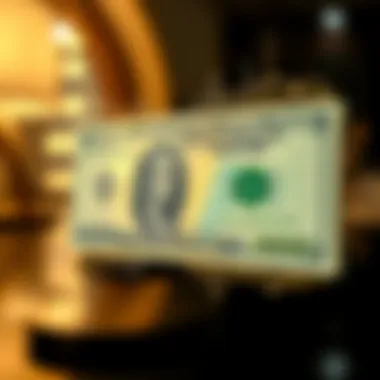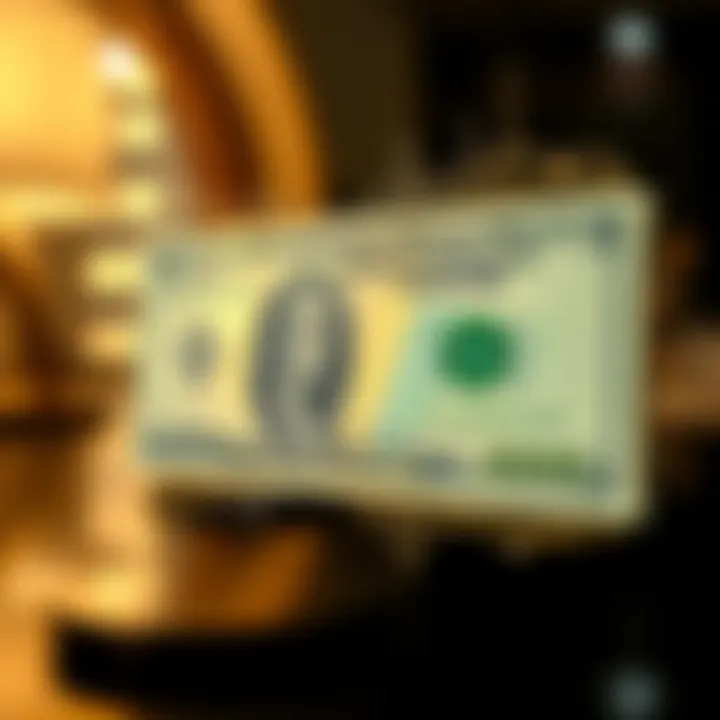Understanding Currency Conversion: 272 USD to AED


Intro
When delving into the world of currency conversion, one immediately confronts a landscape intricate with nuances and ever-changing factors. The exchange rate between the US Dollar (USD) and the UAE Dirham (AED) stands as a vital cog for countless transactions ranging from everyday purchases to significant property investments. As we explore the conversion of 272 USD to AED, it becomes clear that understanding these financial dynamics not only aids expatriates and investors in navigating the market but also enriches their decision-making process. By illuminating the historical context, market trends, and practical considerations, this article aims to equip readers with essential knowledge that will be useful as they step into the real estate scene of the United Arab Emirates.
Property Listings Overview
The UAE real estate market is alive with opportunities, particularly for those armed with the right information. When tackling property investments, especially when converting money from dollars to dirhams, being aware of current market conditions is paramount.
Current Market Trends
Currently, the market has been witnessing a fluctuating environment due to multiple factors, including:
- Global Economic Events: The economic climate in the US directly affects the USD's strength and, consequently, the conversion rates to AED. Global uncertainties can swing these rates in unexpected directions.
- Inflation Rates: Variations in inflation can alter purchasing power. Investors must consider how inflation both in the United States and in the UAE could impact property values.
- COVID-19 Aftermath: Post-pandemic recovery strategies influence both local and international investments, creating dynamic opportunities for buyers.
Featured Properties
For those looking to make the leap into property ownership, 272 USD converted to AED can afford a range of options. For instance, homes in bustling urban areas or instantly growing suburbs offer something for everyone. Properties such as:
- Luxury Apartments in Dubai Marina: Exemplifying luxury living, prices here fluctuate based on demand and amenities provided, making them an attractive consideration.
- Villas in Abu Dhabi: More spacious homes situated in serene environments can be garnered with careful consideration of the ongoing rates.
It's worth noting that each property listing carries its unique financial implications, particularly when grappling with currency conversion.
Buying Guide
Translating interest into ownership involves navigating a complex buying process. Understanding each step aids not only in successful transactions but also in ensuring maximum value for money.
Steps to Purchase
- Research the Market: Keep abreast of ongoing trends and properties that pique interest. Utilize tools like Property Finder or similar sites to gather data.
- Determine Your Budget: Take into account the conversion from USD to AED. Understanding where 272 USD fits into your budget after conversion is essential.
- Engage a Local Real Estate Agent: Finding an agent experienced in the UAE market could prove invaluable for navigating local nuances.
- Make an Offer: Once a property resonates with you, working closely with your agent to formulate a credible offer is crucial.
- Finalize the Deal: This step often involves negotiating terms, getting the necessary approvals, and, of course, ensuring that the financial transactions align correctly.
Key Considerations for Investors
Investing in property abroad can be laden with pitfalls, thus it's prudent to keep the following points in mind:
- Currency Fluctuations: Regularly monitor USD to AED rates to make informed decisions regarding when to buy or sell.
- Legalities: Understand the local laws regarding foreign ownership and taxes to avoid surprises down the road.
- Market Saturation: Identify if the segment you're interested in is becoming too crowded or if there's still room for growth.
Engaging in the UAE property market necessitates a robust understanding of currency conversion. As outlined, knowing how 272 USD translates into AED offers a foundational start for aspiring investors and expatriates. The interplay between global economic conditions and local market tendencies makes this a constantly evolving landscape.
Preamble to Currency Conversion
Currency conversion plays a pivotal role in today's interconnected world. As individuals and businesses venture beyond their own borders, grasping the intricacies of converting one currency into another becomes more than just a necessity; it's a skill that can dictate financial success or pitfalls. Each currency functions within its native economic bubble, influenced by a myriad of factors like national policies, market confidence, and global economic trends.
Understanding currency conversion can drastically affect those looking to invest, expatriates working abroad, or tourists wishing to make the most out of their travel budgets.
What is Currency Conversion?
Currency conversion is the process of exchanging one currency for another. Every country has its own currency, reflecting its economic health and value in the global market. This undertaking can range from the simple act of getting cash to pay for meals abroad to more complex transactions involving investment in foreign markets. When you think about converting USD to AED, it involves knowing how much of the latter you’ll receive for each unit of the former based on the current exchange rate.
Different institutions set these rates, which can vary based on where and how you exchange your money. Banks, exchange platforms, and airports, for instance, may all offer different rates for the same conversion. It’s essential to stay savvy about these rates, as small differences can lead to significant losses or gains, particularly with larger amounts.
The Importance of Understanding Exchange Rates
Understanding exchange rates is crucial for several reasons:
- Investment Decisions: For property investors, fluctuating rates can impact the overall cost of acquiring an asset abroad. Understanding these rates can help in timing purchases or sales to maximize profit.
- Budgeting: Expatriates must be proficient in currency management. Knowing how rates work allows for better budget planning, especially for those receiving salaries in a different currency.
- Travel Planning: Tourists can benefit significantly from perceptive currency conversion knowledge. Awareness of current rates aids in setting a realistic travel budget and helps to avoid overspending.
"Currency conversion is not just numbers; it’s the gateway to understanding how far your money travels across borders, impacting lifestyles and investment opportunities like never before."
In summation, currency conversion is deeply intertwined with global finance, pushing the narrative of how we engage with foreign markets. Exploring this topic offers invaluable insights, especially when discussing specific cases, such as converting 272 USD to AED. As we delve further into the mechanics behind exchange rates, historical trends, and practical calculations, we equip readers with the foundational knowledge needed to navigate these waters with confidence.
The Current Exchange Rate
Understanding the current exchange rate is crucial for anyone looking to convert currency, especially when the focus is on a specific amount like 272 USD to AED. Exchange rates can vary from day to day, shaped by numerous factors that reflect economic conditions, market sentiment, and geopolitical events. Knowing how these fluctuations can affect the amount of AED you might receive for your dollars can impact both casual travelers and serious investors.
This section will delve into two fundamental areas: an overview of the current rate and the implications of fluctuating rates, which are essential for making informed financial decisions.
Current Rate Overview
As of the latest update, the exchange rate for USD to AED floats around a specific range that is tightly regulated. It's worth noting that the UAE dirham is pegged to the US dollar, maintaining a stable rate that reduces uncertainty for investors and businesses alike. Typically, the rate hovers around 3.67 AED for 1 USD. However, this rate is not static.


Several factors contribute to slight variations in the conversion process:
- Central Bank Policies: The UAE Central Bank plays a vital role in stabilizing the dirham against the dollar, which helps maintain currency stability and can influence exchange rates.
- Inflation Trends: Inflation rates in the US affect purchasing power and, consequently, the strength of the dollar relative to the dirham.
- Market Demand: Currency demand fluctuates based on current events, investor behavior, and changes in trade relations.
By keeping an eye on these elements, you can better anticipate how much AED you will receive for your USD, especially if making significant transactions is on the agenda.
Implications of Fluctuating Rates
The impact of fluctuating exchange rates can be quite pronounced for those dealing with currency conversion, particularly for expatriates and investors in real estate. When the rate changes, so do the amounts exchanged, which can directly affect budget forecasts and financial strategies. Here are some implications to consider:
"A change in exchange rates can turn a profitable deal into a loss overnight if not carefully monitored."
- Investment Timing: Investors looking to purchase property with converted funds should be particularly attuned to rate shifts.
- Cost of Living: For expatriates receiving salaries in USD, a falling dollar compared to the dirham can decrease purchasing power in the UAE.
- Risk Management: Businesses should hedge against currency risk, particularly in sectors like tourism and real estate, where profits can hinge upon favorable exchange rates.
When engaging in currency exchanges, it’s advisable to stay informed on these fluctuations to ensure optimal outcomes.
Historical Context of USD to AED
Understanding the historical context of the USD to AED exchange rate is crucial for anyone looking to engage in financial activities, especially property investments in the UAE. The fluctuations and trends of this currency pair have not only shaped the economic landscape in the region, but also provide valuable insights for investors and expatriates alike. By exploring the past movements of the dollar against the dirham, we can better navigate the current market dynamics and anticipate future shifts.
Evolution of Exchange Rates
The evolution of currency exchange rates often tells a story beyond mere numbers. Back in 1973, when the UAE was established, the Emirati dirham was pegged to the US dollar. Initially, this peg was set at a rate of 3.67 AED to 1 USD. Over the years, while the dirham has retained this peg, the approach to managing the exchange rate has transformed significantly. This stability can be partially attributed to the UAE's oil wealth and strategic economic policies.
A key moment occurred in the early 2000s, with the advent of globalization. The exchange rates became more responsive to global economic conditions. During this period, the value of the dollar began to fluctuate due to a series of economic crises and geopolitical tensions. Such variations affected investor sentiment and determined when they would engage in currency conversion for property investments.
The history of inflation and interest rates in both the U.S. and the UAE played a pivotal role in the evolution. Differences in economic health prompted changes, yet the peg maintained a semblance of stability. Investors need to understand these patterns to better anticipate potential reactions to economic announcements or global events.
Impact of Global Events
Global events often have cascading effects on exchange rates, making understanding their impact vital for potential investors. For instance, the 2008 financial crisis sparked massive swings in currency values. While the dirham was pegged to the dollar, the related economic instability made many investors wary.
Fast forward to the present, recent geopolitical tensions and changes in international trade policies have also influenced the USD/AED rate. Fluctuations in oil prices, tied closely to UAE's economy, further complicate this picture.
The interplay of global events can create opportunities along with challenges.
Invariably, the rise of financial technology and currency trading platforms has enabled investors to respond more swiftly to these changes. Thus, understanding these events, and their historical context can turn out to be an invaluable asset when managing investments involving currency conversion.
For more detailed insights into economic indicators and how they relate to foreign exchange changes, resources like Britannica or Wikipedia can be a starting point in deepening your understanding.
Factors Influencing Exchange Rates
Understanding the forces that shape exchange rates is crucial for anyone dealing in currency conversion, especially when considering an amount like 272 USD to AED. Several dynamics play a vital role in determining these rates at any given moment. With different countries exhibiting unique economic conditions, knowing how these factors operate can help expatriates and investors make informed decisions.
Economic Indicators
Economic indicators are the bedrock of exchange rate determination. They provide insights into the economic health of a nation, which in turn affects currency strength. These indicators are a collection of statistics that reflect the overall condition of an economy, impacting everything from inflation to employment. Two essential economic factors to consider are inflation rates and interest rates.
Inflation Rates
Inflation rates indicate the pace at which prices for goods and services rise. A key characteristic of inflation rates is how they reflect consumer purchasing power. High inflation in a country can lead to a depreciation of its currency. For instance, if the US experiences higher inflation compared to the UAE, the USD might lose value against the AED.
This aspect is beneficial for the article because it underscores how inflation impacts the buying power of money, making it a pivotal consideration when converting currencies. Generally, stable or low inflation is favored for currency valuation. However, soaring inflation brings along disadvantages, such as eroding consumer confidence and prompting a sell-off of assets denominated in that currency.
Interest Rates
Interest rates are another crucial economic indicator closely scrutinized by investors when assessing exchange rates. They represent the cost of borrowing money and are typically set by a country's central bank. The defining feature of interest rates is their direct correlation with economic activity: higher rates often attract foreign investment, pushing up the currency's value.
Interest rates are particularly relevant for this article, as they directly affect investment decisions and currency flow. When interest rates in the US are higher relative to the UAE, it often leads to a demand surge for USD, enhancing its value against the AED. Yet, if rates are perceived as too high, it might signal economic troubles, putting a damper on investment and causing currency depreciation.
Political Stability
In addition to economic indicators, political stability is a fundamental factor that influences exchange rates. A politically stable environment promotes confidence among investors. When countries face political unrest or instability, their currencies can experience significant volatility.
For example, if there are elections in the US causing uncertainty, investors might hesitate to hold USD, fearing potential outcomes that could affect economic policies. This sense of insecurity can weaken the currency in question. Thus, understanding the degree of political stability helps expatriates and investors gauge the potential risks associated with currency conversion.
"Political stability plays a vital role in maintaining the strength of a currency in the global market."
In summary, awareness of economic indicators like inflation and interest rates, combined with the current political climate, can significantly empower individuals and investors to navigate the often complex domain of currency conversion, particularly relevant for understanding the conversion of 272 USD to AED.


Calculating Currency Conversion
Understanding how currency conversion works lays the groundwork for making informed financial decisions, particularly when dealing with foreign currencies like the United States dollar (USD) and the Emirates dirham (AED). Currency conversion is essential in our increasingly interconnected world, where individuals and businesses engage in international transactions regularly. Knowing how to calculate currency conversion helps expatriates, investors, and travelers manage their finances more effectively and avoid costly mistakes.
Formula for Conversion
To convert currency from one form to another, a precise formula is essential. The basic formula for conversion from USD to AED can be expressed as follows:
[ \textAmount in AED = \textAmount in USD \times \textExchange Rate ]
For instance, if the current exchange rate is 3.67 AED for every 1 USD, you'd multiply your dollar amount by this rate to calculate how much you’re getting in dirhams. This equation is straightforward, but the crux of effective currency conversion lies within understanding the fluctuations in exchange rates.
Practical Examples
Converting USD to AED
Let’s put this formula to the test by converting 272 USD to AED. If one were to apply the earlier mentioned exchange rate of 3.67,
[ 272 \text USD \times 3.67 \text AED/USD = 999.04 \text AED ]
Thus, 272 USD would equate to approximately 999.04 AED. This conversion exemplifies a simple yet valuable process that can yield significant insights for anyone looking to navigate financial dealings in the UAE. Understanding this conversion aids expatriates in budgeting efficiently and investors in gauging costs associated with property purchases.
Particularly, when investors convert their funds before making property investments, knowing the exact amount they will transact in AED becomes vital. Currency conversions can shape financial strategies and provide clarity in investments.
Real-life Applications in Real Estate
The real estate market in Dubai is increasingly attracting international investors, making it necessary to understand practical applications of currency conversion. When prospective buyers consider property purchases in AED, accurately converting their USD holdings can mean the difference between seizing a lucrative opportunity or falling short entirely.
For example, a real estate agent might advise buyers to have their funds converted to AED prior to a purchase to lock in their rate, minimizing exposure to volatility.
Investors should also keep in mind that different exchanges offer varying rates, and knowing the best time to convert can save them a considerable amount. Along with fundamental knowledge of exchange rates, understanding local market dynamics augments the overall investment strategy, ensuring you are on top of your game in an ever-changing landscape.
Currency Conversion Tools
Currency conversion tools are indispensable for anyone navigating the global financial landscape, especially when it comes to converting currencies like USD to AED. These tools offer not just convenience, but an array of functionalities that can save users both time and money. In the realm of property investment in the UAE, precise financial calculations are paramount, making these tools invaluable for expatriates and investors aiming to maximize their purchasing power.
Online Currency Converters
Online currency converters are perhaps the most user-friendly tools available in the digital age. With just a few clicks, individuals can enter an amount in USD and receive an instant conversion to AED based on current market rates. Websites like OANDA and XE are popular choices among users, catering to various needs from casual conversions to more in-depth financial analysis.
However, it is essential to be aware that not all online converters reflect the same rates due to varying data sources and algorithms. Thus, comparing multiple platforms can lead to a more accurate understanding of the total costs associated with conversions.
Furthermore, these converters often provide historical data, allowing users to track fluctuation trends over time. This feature can be particularly beneficial for property investors who may want to assess the best times to make significant currency exchanges based on past performance.
"In the complexity of currency markets, having the right tools at your fingertips is undoubtedly a game changer, especially when you're investing overseas."
Bank Rate vs. Market Rate
When it comes to currency conversion, understanding the disparity between the bank rate and the market rate is crucial. The market rate, often referred to as the interbank rate, is the rate at which currencies are exchanged between banks. This rate fluctuates constantly, influenced by various economic indicators such as inflation, GDP, and trade balances.
On the other hand, the bank rate is the rate that individuals and businesses typically receive when exchanging currency through banks. Most often, this rate includes a markup, meaning that customers often pay more than the prevailing market rate.
For expatriates and investors, catching a glimpse into both rates can have significant financial repercussions. Here’s a breakdown of considerations:
- Conversion Costs: Always check both rates when planning a conversion. The difference can lead to unexpected costs or savings.
- Timing: If there’s a gap between the bank and market rates, timing your conversions could yield better returns.
- Third-party Services: Some platforms offer lower conversion rates than banks, which might be advantageous for larger sums, such as those involved in property transactions.
Wrap your head around these factors, as they could save you a few dirhams or even dollars when exchanging currency as part of your investment strategy.
Financial Considerations for Expatriates
Navigating the financial landscape as an expatriate can be both an exhilarating and daunting task, especially when considering property purchasing in the UAE. Expatriates, often finding themselves in a foreign environment, need to grasp the monetary implications that come with conversion from USD to AED. Understanding these considerations is fundamental, as they can significantly influence both short-term expenditures and long-term investments.
When you think about it, an expatriate's financial success largely hinges on currency fluctuations, exchange rates, and how these factors play out in the real estate sector. Knowing how to manage these aspects can be the difference between making a solid investment or losing out significantly.
Implications for Property Purchasing
For many expatriates considering a property purchase in the UAE, understanding the currency dynamics is crucial. The value of 272 USD when converted to AED can vary, affecting the buyer's budget. It’s not just about the conversion rate itself but also understanding the timing of purchases. Currency fluctuations can lead to substantial changes in buying power; thus, knowing when to make a transaction could help get the most bang for one’s buck.
Additionally, properties in Dubai and other emirates are often priced in AED. For expatriates, this means that a thorough understanding of how the USD translates into AED is essential, especially when calculating total costs, including fees, taxes, and other expenses associated with property buying. Being informed can potentially save thousands. Here are a few key factors for expatriates:


- Exchange Rate Awareness: Keeping a close watch on the exchange rate ensures timely purchases.
- Total Expenses: Beyond just the property price, expenses can add up, making it crucial to calculate total conversion amounts.
- Market Timing: Engaging with the market at the right time can greatly impact overall investment success.
Managing Currency Risk
Currency risk management is another vital aspect life for expatriates. With the constant ebb and flow of exchange rates, especially for currencies like USD and AED, devising a strategy to protect against adverse currency movements becomes a necessity.
For instance, expatriates may opt for hedging their currency exposure. Using contracts to lock in exchange rates could prevent unexpected losses that could occur due to sudden market changes. This is especially significant for those looking to invest a hefty sum like 272 USD converted into AED. Here are some actionable tips for managing currency risk:
- Diverse Currency Holdings: Consider maintaining accounts in both USD and AED to better support currency fluctuations.
- Consult Financial Experts: Engaging financial advisors who understand both local and international markets can provide valuable insights.
- Regular Monitoring: Keeping an eagle eye on currency trends and global economic indicators is paramount.
Managing finances in a foreign currency comes with its set of challenges, but proactive measures can help expatriates safeguard their investments, ensuring fruitful expatriate living in the UAE.
"The best way to predict your future is to create it." - Abraham Lincoln
By staying informed and vigilant about currency conversions and financial implications, expatriates can protect their investments and navigate the complex world of real estate in a foreign land with far more confidence.
The Role of the UAE Economy
The UAE economy acts as a critical backdrop to understanding currency conversion, particularly for anyone looking to make sense of the 272 USD to AED conversion. The country's economic stability and growth directly relate to how the AED performs in the global market. When evaluating currency strength, it is vital to consider not only how the AED stacks up against the USD but also the various factors that contribute to its resilience.
Strength of the AED
The strength of the AED is tied intrinsically to the UAE’s oil wealth and diversified growth strategies. Historically, the UAE has prided itself on having a strong currency, pegged to the US dollar since 1997. This peg helps stabilize the exchange rate, which is advantageous for expatriates and investors alike.
Key Considerations:
- Oil Dependency: The UAE's economy often rises and falls with oil prices. If oil booms, it sates the country’s economy, enhancing the AED’s purchasing power. Conversely, a slump in prices might weaken the currency.
- Economic Diversification: The UAE has made substantial strides in diversifying its economy. Sectors such as tourism, aviation, and real estate now contribute significantly to the national GDP. A strong performance in these sectors can stabilize and boost the AED.
- Foreign Reserves: The UAE holds significant foreign reserves, which helps back the currency. A robust reserve often translates to investor confidence and a strengthened national currency.
Investment Opportunities in Dubai
Dubai stands out as a beacon for investment opportunities, making it a destination of choice for expatriates and seasoned investors looking to dip their toes into the robust property market. The convergence of economic factors has turned Dubai into a veritable hub for real estate investments.
Key Aspects of Investing in Dubai:
- Growing Expat Population: Dubai is a melting pot of cultures, with a thriving expat community. This population growth translates to high demand for residential property, supporting appreciation in real estate values.
- Government Incentives: Initiatives like the long-term visa permits and golden visas have sparked a surge in foreign investment in property. These policies are designed to attract global investors and support living stability for expatriates.
- Infrastructure and Connectivity: The government continues to invest heavily in infrastructure, making access to property and facilities easier. From world-class amenities to seamless connectivity, Dubai is equipped to draw in investors.
- Market Transparency: The real estate market in Dubai is underpinned by a solid legal framework, which adds a layer of security for investors. Regulatory bodies like the Dubai Land Department operate to create transparency in transactions.
"Understanding the vibrant economy of the UAE is crucial for anyone considering currency conversion and investment opportunities in Dubai. With a stable currency and a wealth of opportunities, it remains one of the most attractive destinations for property buyers."
With these points in mind, those looking to convert currency or invest in Dubai must evaluate how the UAE's economic landscape plays a significant role in shaping their overall investment strategy. The AED's strength and the investment opportunities available can influence decisions that affect foreigners and expatriates in tangible ways.
Practical Steps for Investors
When it comes to investing in the UAE property market, understanding currency conversion is fundamental. Particularly when dealing with figures like 272 USD, investors need to grasp the implications of the exchange rate and take measured steps in their approach. Here, we break down the practical steps that investors should take when navigating this complex terrain.
Researching the Market
Research plays a critical role in successful investments. Before diving into currency conversion, one must keep tabs on both global and local economic indicators to predict potential shifts in the exchange rate. This involves understanding the current market trends, such as:
- Local Property Prices: Knowing what to expect in terms of property costs in the UAE is essential. Prices can fluctuate based on market demand, and having solid data allows for more informed decisions.
- Currency Exchange Trends: Monitor how the USD to AED exchange rate changes over time. Historical data may reveal patterns useful for timing your currency conversions.
- Economic Conditions: Keep an eye on inflation rates, government policies, or any geopolitical events that might affect the currency values.
"The more informed the investor, the healthier the return on investment."
Additionally, making use of numerous resources can aid considerably in this research. Websites such as Wikipedia and Investopedia provide insightful information that can be beneficial to understanding currency markets and property investments.
Seeking Professional Guidance
While self-research is important, seeking professional guidance can be a game changer. Financial advisors and property consultants often have a wealth of knowledge and insights that individual investors may not possess. Here are some areas where professional help can really make a difference:
- Advice on Currency Risks: Currency fluctuation can significantly impact your investment. Specialists can provide risk assessment and hedging strategies related to currency conversions—helping you to sidestep potential losses.
- Investment Analysis: Professionals can offer opinions on the property’s real value and potential growth, ensuring that your investment is sound, despite any changes in exchange rates.
- Navigating Legalities: Understanding the legal implications of purchasing property abroad can be complicated. Experts can guide you through local laws and regulations—keeping you on the right side of legality.
In summary, when investing in the property market of the UAE, a thorough understanding of currency conversion plays a crucial role. As one navigates the unique challenges and opportunities of foreign investments, these practical steps—researching the market and seeking professional advice—become indispensable parts of a robust investment strategy.
The End
In wrapping up this detailed assessment of currency conversion, particularly regarding 272 USD to AED, it becomes clear just how pivotal this subject is for various stakeholders, from expatriates to real estate investors. Navigating the currents of currency conversion isn't just a matter of knowing the numbers; it encompasses a broader understanding of market trends, historical shifts, and the economic landscape of the UAE.
Summary of Key Points
- The importance of exchange rates is paramount. Understanding them empowers investors to make informed decisions.
- Historical context aids in predicting future movements. As we saw, events like global economic crises can play a major role in fluctuations, impacting the conversion rate significantly.
- For those looking to engage in property investment, the relationship between the USD and AED is crucial, impacting costs, returns, and overall strategy.
"To ignore these factors is to gamble with one's financial future in a market that is ever-changing."
Future Outlook
The future of currency conversion, particularly from USD to AED, is likely to be shaped by a variety of factors including geopolitical tensions, shifts in oil prices, and developments in the global economy. For potential investors, keeping an eye on these factors could be the difference between profit and loss. Emerging trends in the UAE's property market suggest that as the region continues to attract foreign investments, the AED may remain relatively strong against the USD.







